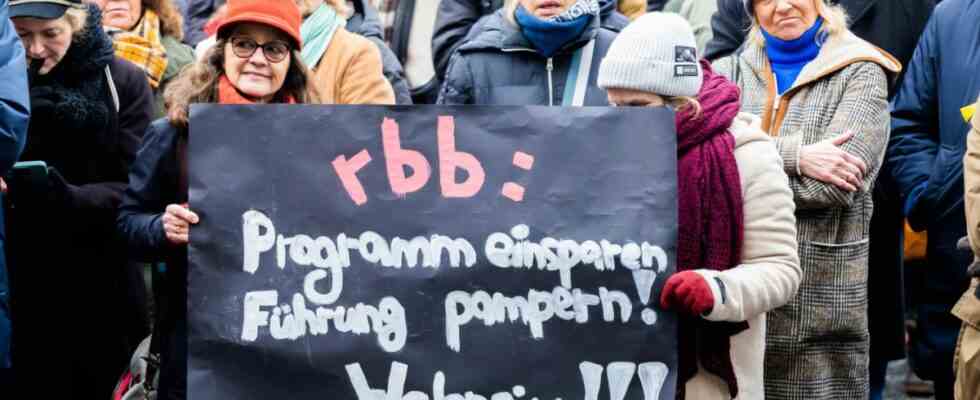On Friday everything came together again at the RBB. Journalists’ associations and unions had called for a warning strike in the midst of the ongoing collective bargaining, which is being conducted particularly hard in this year of reappraisal and austerity at the RBB. On posters, employees in Berlin complained about the cost-cutting measures by director Katrin Vernau and the general conditions in the station. Some RBB programs were canceled, such as that lunchtime magazine in the first and in the ZDF. In the afternoon, the station’s Broadcasting Council met in Potsdam after the last meeting a week earlier had failed – because too few members of the supervisory body were physically present.
In the special session, the strike was not even mentioned for a long time. The topic was not the hard cuts in program and staff, but the ever-longer, ever-expensive legal clarification of the scandals of the past few months about wasting money and felt. It was recently announced that RBB had spent 1.4 million euros on four commissioned law firms by the end of November alone. The news that the law firm Lutz Abel, which was commissioned with a compliance check, will not be able to finish its final report at the end of February as expected, caused great anger in the Broadcasting Council. Dorette König, Chair of the Board of Directors, said the end of April was the new date given by the law firm, and only with reservations.
Lutz Abel was commissioned last summer to examine “unwanted structural developments” at the station – the law firm is to investigate the events that became known in the press and all others that come up in the course of the investigation. König now defended this “deliberately broad test assignment” before the Broadcasting Council. The law firm itself sent a letter saying that what had recently been reported was not correct: namely that the lawyers were doing double work and that they were assisting the public prosecutor’s office without being obliged to do so, thus causing more costs. The law firm had already settled around 980,000 euros gross by the end of November. In the knowledge that one works for an institution financed by public law, a reduced hourly rate of 300 euros per hour was agreed. But it is impossible that, as promised, the work will be completed by the end of February.
“What would be the alternative?” asks the chair of the board of directors
This information provoked a discussion in the panel that lasted several hours. Because the final report was originally expected at the end of December last year, then in January, now the test will continue for at least another three months and will incur costs. And that’s only if the lawyers shouldn’t come across any further “surprises” in the documents still to be examined.
Broadcasting councilor Antje Kapek, Green politician in the Berlin House of Representatives, criticized that the mistake was in the order to the lawyers. They were given a blank check and now have to be careful that the compliance procedure itself does not become a compliance case.
In fact, it looks as if the claim to have the law firm “fully” cleared up has led the broadcaster into a whole new dilemma – and artistic director Katrin Vernau has been able to save on programming and employees as the broadcaster’s boss in order to make up for a crowd to pay lawyers. Vernau himself tried to defend the rat tail, which was worth millions: “The legal fees were known.” Anyone who wanted to know could also know that the costs have now totaled more than one million euros. The chair of the board of directors, Koenig, also emphasized that you practice putting pressure on the law firm as far as possible, but now you have to wait for the result. “What would be the alternative?”
Several members of the Broadcasting Council had a simple answer to this: the whole thing should be ended, the test should be stopped prematurely. This is what the chairman of the committee, Ralf Roggenbruck, initially said.
There was neither an agreed upper cost limit for Lutz Abel’s work, nor was it possible to estimate costs before the assignment, said the Chair of the Board of Directors, König, at the meeting. According to König, the law firm did not in fact meet the time expectations. She would have “very much wished” that the exam had been completed by the end of the year. The Broadcasting Council eventually agreed to ask the Chancellery to report on its progress in the investigation in a month’s time.
The lawyers presented a first interim report at the end of October. But the most serious allegations, which include the award of consultancy contracts for the construction of the digital media house, which has since been stopped, are still pending. The extent of the problems still impresses her, said Katrin Vernau. She took over the management of the channel in September, a few weeks after her predecessor Patricia Schlesinger had to give up her positions as ARD chairwoman and RBB director.

